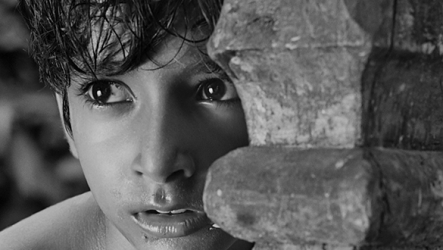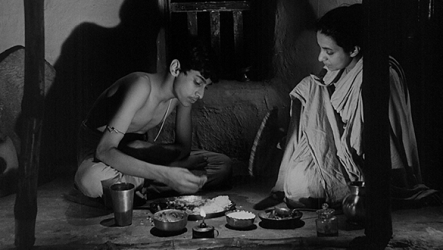On occasion of the 100th birthday of Satyajit Ray, the 12th AGFF honors one of India’s greatest cinema creators. Ray was born in Calcutta and lost his father at a very young age. He studied in the fine arts under the guidance of the great thinker Rabindranath Tagore, and worked as a graphic designer and artistic director in commercials. In 1947, he founded the Calcutta Film Society and in a journey of six-months in Europe he managed to see over 100 films. The influence of Italian Neorealism bearing over his work is evident from his very first films, especially the “Apu Trilogy”, which we will be screening in our tribute.
After overcoming a series of obstacles in his debut film Pather Panchali (1955), Ray proved that Indian cinema was not to be confined within the scope and limitations of Bollywood. Through the eyes of young Apu, a child, he presents the harsh side of reality in Bengal, with great tenderness. The trilogy’s second film, Aparajito (1956), focuses on Apu’s coming of age, infusing it with clear autobiographical elements and despite its minimalist formalism allows it to contain great emotional depth. Inspired by the great filmmakers of his time, such as Jean Renoir - a lifelong friend– in The World of Apu (1959), his third film, Ray observes Apu as a mature adult, whilst fusing his neorealist sensibilities with formalistic ambitions and pursuits. It is worth noting that the soundtrack of all three films was scored by Ravi Shankar.
Working up to his death in 1992, Ray managed to direct a total of 36 films. His cinema is mainly of a realistic tone whilst minimalist in its form, yet manages to be deeply humane. Ray moves effortlessly between India’s tradition and modernisation, and poses meaningful questions, such a woman’s standing in society, colonialism and the rigid structures and rules of India’s culture and society. In the words, of the great and inimitable humanist filmmaker Akira Kurosawa “Not to have seen the cinema of Ray means existing in the world without seeing the sun or the moon”.
Film Selection: Maria Komninos
Programming: Ioanna Pipides
Introductory text: Ioulia Mermigka







